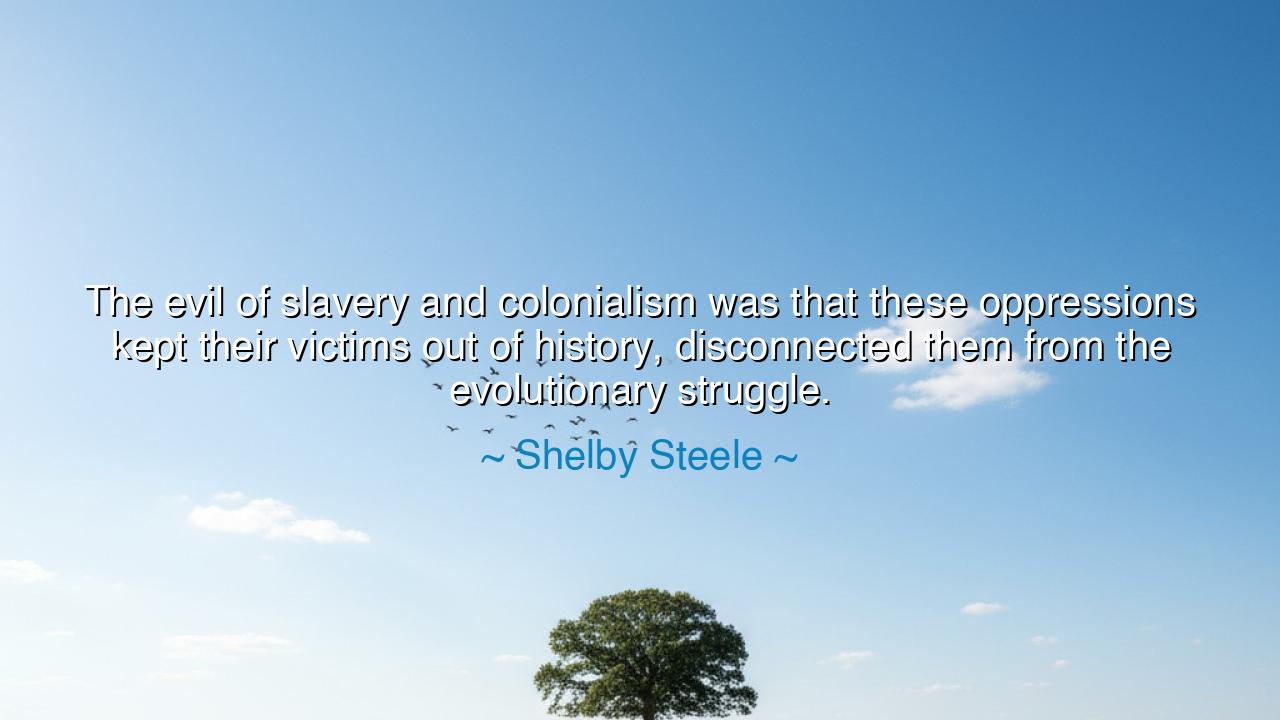
The evil of slavery and colonialism was that these oppressions
The evil of slavery and colonialism was that these oppressions kept their victims out of history, disconnected them from the evolutionary struggle.






When Shelby Steele declared, “The evil of slavery and colonialism was that these oppressions kept their victims out of history, disconnected them from the evolutionary struggle,” he spoke with the clarity of one who peers into the deepest wounds of civilization. His words reveal a truth both profound and painful: oppression is not only the denial of freedom in the present, but the erasure of presence in the story of humanity. To be removed from history is to be stripped of agency, memory, and the connection to the struggle that shapes progress. Slavery and colonialism did more than subjugate bodies; they severed souls from the lineage of their own evolution.
The origin of this reflection lies in Steele’s study of African American and post-colonial experiences. He examines not merely the physical cruelties inflicted, but the intellectual, cultural, and historical consequences of oppression. By disconnecting the victims from their role in history, oppressors attempted to render them invisible, to deny their participation in the march of humanity. Steele emphasizes that this denial is itself a profound injustice, as it robs individuals and communities of the ability to see themselves as active agents in the shaping of their world.
Steele’s insight resonates with the wisdom of the ancients, who recognized that memory and history are essential to identity. The Greek historian Herodotus chronicled the deeds of peoples not only to record events, but to ensure that the lessons and struggles of civilizations would inform the present and future. To be left out of history is to be denied the opportunity for wisdom, reflection, and advancement. Oppression, Steele reminds us, is not only a denial of freedom—it is a rupture in the chain of human understanding.
Consider the story of the enslaved Africans brought to the Americas. Stripped of names, families, and languages, they were forcibly removed from the histories of their homelands and denied the ability to record their own narratives. The result was a disconnection not only from the past but from the evolutionary struggle of societies striving toward justice and self-determination. Only through generations of resistance, storytelling, and cultural preservation did African Americans begin to reclaim their place in history, demonstrating Steele’s point: oppression seeks not only to dominate the present, but to erase the link between people and their destiny.
The meaning of Steele’s words extends beyond slavery and colonialism into a broader understanding of historical and social justice. Societies that erase or marginalize the contributions of certain peoples commit a profound injustice: they deprive both the oppressed and the oppressors of the lessons that struggle provides. History, when inclusive, is not simply a record of events but a living map of human resilience, adaptation, and growth. The denial of this history is an assault on the collective intelligence of humanity.
Steele’s reflection also contains a moral and philosophical lesson: to honor those who have been oppressed, we must actively restore their stories, recognize their contributions, and integrate their experiences into the narrative of human evolution. From the literature of Frederick Douglass to the oral histories preserved in African diasporic communities, reclaiming history becomes a form of resistance, agency, and self-affirmation. By reconnecting the oppressed to their history, we restore both dignity and perspective, enabling participation in the shared struggle of civilization.
O listener, take this teaching to heart: study the stories of those erased, listen to voices long silenced, and recognize that history is not complete without every human contribution. By honoring memory and reclaiming narratives, we strengthen the chain of knowledge and ensure that the lessons of struggle, resilience, and wisdom are carried forward. Steele’s insight urges us to remember that the past is the soil from which understanding and freedom grow, and that inclusion in history is essential to the human spirit.
In the end, Shelby Steele reminds us that oppression’s deepest crime is not merely physical domination, but the severing of connection to history and evolution. To resist this, we must preserve memory, amplify silenced voices, and recognize that the struggle for justice is inseparable from the act of remembering. True liberation requires both freedom in the present and recognition in the continuum of human history, restoring the place of every individual and every people within the ongoing march of civilization.






AAdministratorAdministrator
Welcome, honored guests. Please leave a comment, we will respond soon